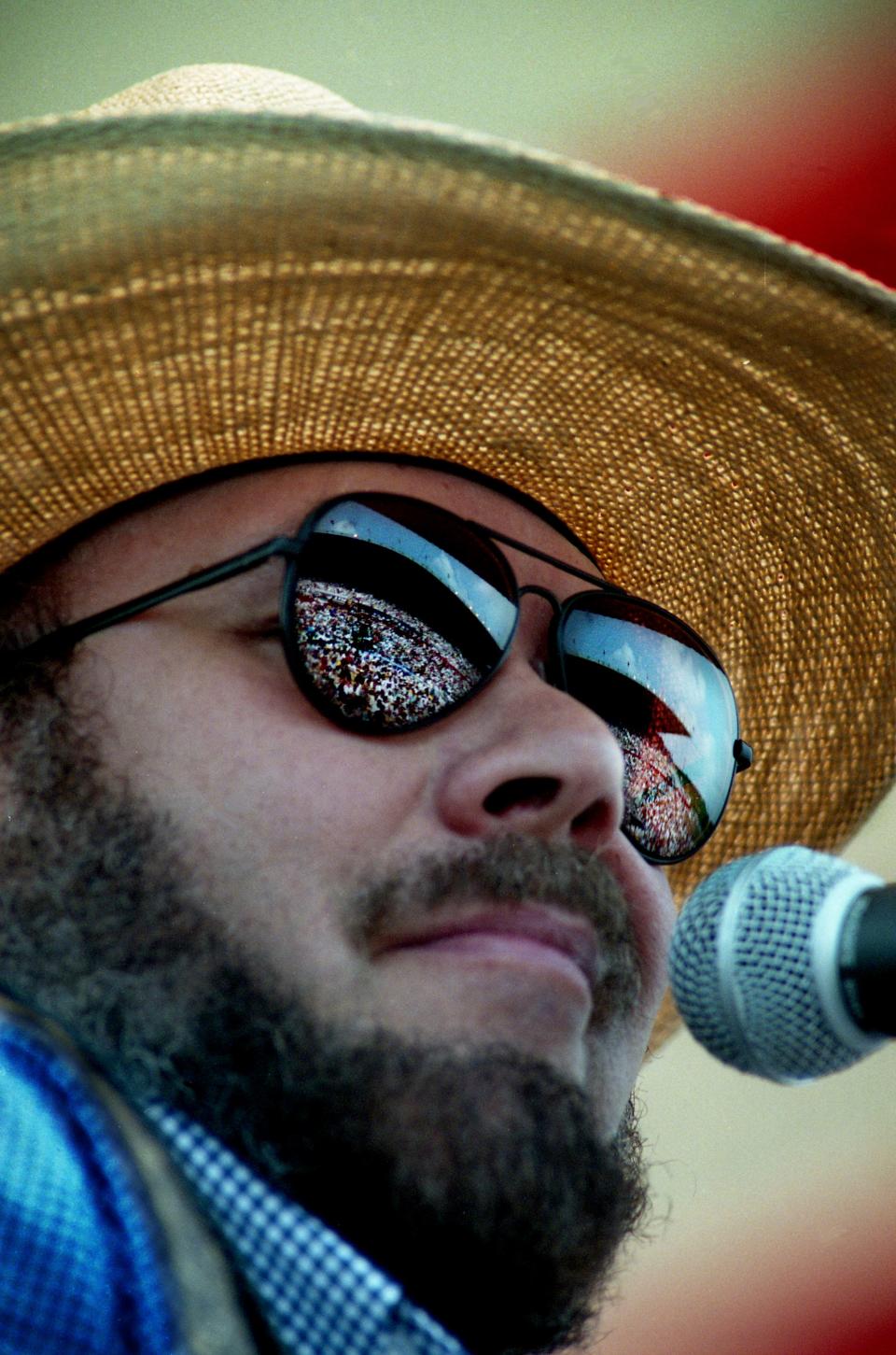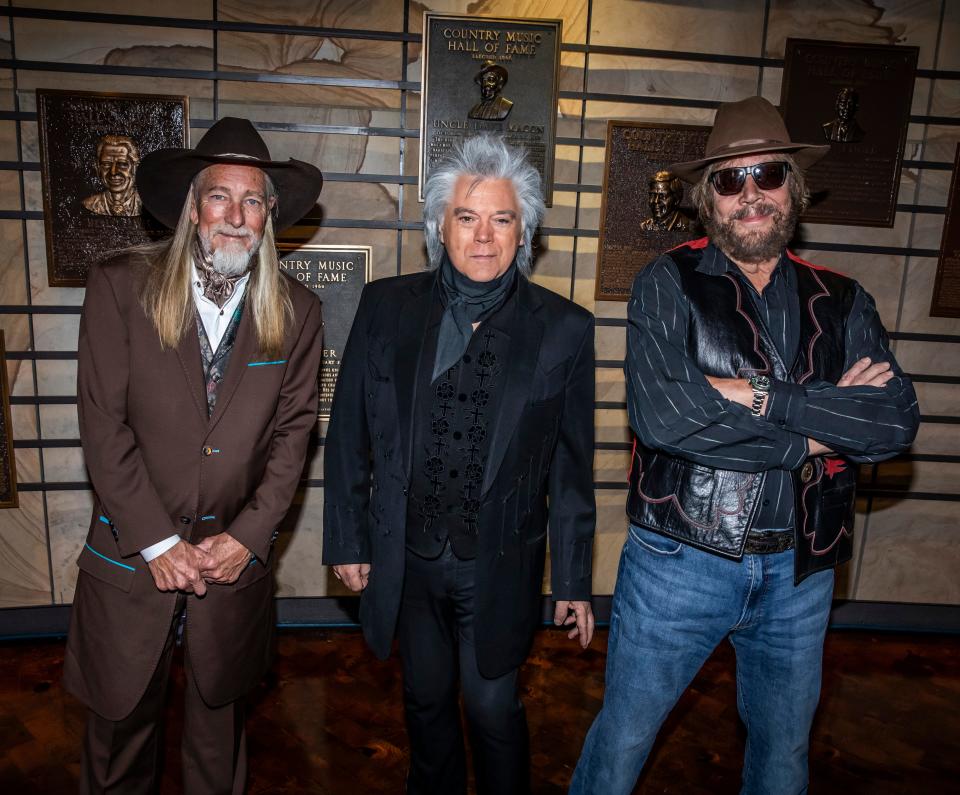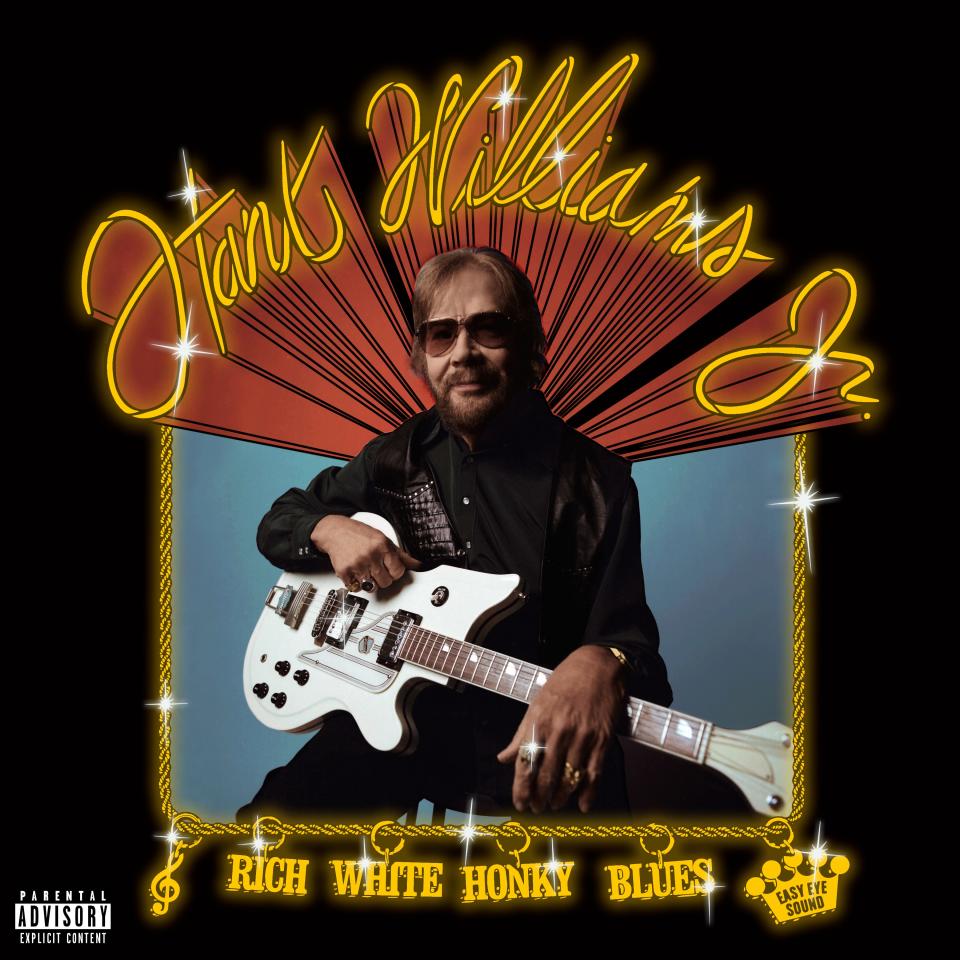Hank Williams Jr. reflects on the blues, his roots and his life on new album
- Oops!Something went wrong.Please try again later.
- Oops!Something went wrong.Please try again later.
- Oops!Something went wrong.Please try again later.
On an overcast April morning, Country Music Hall of Famer Hank Williams Jr. is relaxing in a makeup chair.
He's on a break while shooting the video for "Georgia Women," the second single from his latest – and 57th – studio album, "Rich White Honky Blues," from Easy Eye Sound.
The album, released June 17, showcases how the legacy of Rufus "Tee Tot" Payne and Grammy-winning Producer of the Year Dan Auerbach aid him in reprising blues classics as the son of "Tee Tot's" most renowned student – his father Hank Sr.
A record where a 72-year-old white man (a "rich white honky" no less) explores the Black-influenced intersection of country music and the Delta Blues could be polarizing. Instead, this one strikes a chord at the core of country music's unique tradition.
While seated in his makeup chair, Williams is smoking a cigar thicker than the spread of his meaty right thumb and a half-inch longer than his middle finger extends. The air fills dense with the acrid smoke, which settles into his black hat, vest, sunglasses, shirt, pants, boots and guitar case.

A clear sonic vision and Redd Foxx influence
Mere weeks after the sudden passing of his wife of 31 years, Mary Jane Thomas, outlaw country's last rowdiest man has settled down, if only for a moment, to discuss his latest album with The Tennessean.
"I named the album after a conversation I had once with Redd Foxx, the comedian," Williams says. "Fred G. Sanford from Sanford and Son Salvage. I love that man." Foxx was the Black comedian whose 1972-77 run as a sitcom star elevated him to iconic levels as a pop-culture touchstone.
"I met (Foxx) when I was a teenager. He was a fan of my father's music because his grandmother introduced it to him. He played the Hippodrome in Nashville, and he told a joke about the 'Rich White Honky Blues' on that stage. I laughed so hard."
The 12-track album was recorded in three days, with less than three takes per track. Tom Osborn, Easy Eye Sound's general manager, is effusive in his praise and gleeful in his reflections about the album's recording process.
Auerbach's "clear sonic vision" and Williams' "concentrated classic sound" quickly gelled, Osborn notes. He adds that the work of a vaunted team of session players – Auerbach, electric slide guitarist Kenny Brown, bassist Eric Deaton and drummer Kinney Kimbrough – proved a potent combination.
But Auerbach recalls that Williams was in a foul mood at the start of recording the album and walked into another room.

Ultimately, Williams calmed, stepped into the studio with his all-star band, and something unprecedented occurred.
“Hank started swearing on these records," Osborn says, trying to hide a smile. "We couldn't cut that from the album. So it became Easy Eye's first-ever album with a 'Parent Advisory' sticker.”
Country legend: Hank Williams, Jr.'s 'Georgia Women' video highlights the legend's charmed Nashville life
New music: Carrie Underwood achieves 'timeless,' legendary country status with 'Denim & Rhinestones'
"When my father was a little boy, he would listen to a street singer named Rufus 'Tee Tot' Payne, every day. When 'Tee Tot' taught him how to play and sing, he learned fast," says Williams about the album's inspiration

Reflections on his epic legacy
He continues with stories about his charmed childhood and the impact of meeting artists who covered his father's songs, like the 1952 classics "Jambalaya" and "Your Cheatin' Heart."
"There's a picture of me at 13 years old at my mama and daddy's house on Franklin Road. I'm holding a Fender Stratocaster from Hank Snow's Music Shop. At that house, every major musical artist who came to town – Fats Domino, Ray Charles, Elvis Presley, Jerry Lee Lewis, Carl Perkins –would stop by to see my father's artifacts and get a picture made standing next to my daddy's piano.
"Eventually, I had a jelly roll hairstyle and was playing with Rockin' Randall and the Rockets, a combo from Overton High School," Williams recalls.
Easy Eye Sound recorded the video for "Georgia Women" at Springwater Supper Club and Lounge, Tennessee’s oldest continuously open and operational bar. The space allows the legend to reflect on the early days of his musical career and song choices like classic blues-inspired lead album single ".44 Special Blues," his cover of R.L. Burnside's 1997-released "Georgia Women," and Lightnin' Hopkins' "Jesus Will You Come By Here."
"I haven't always walked out in front of 25,000 people," he says. "I have played more than a few honky-tonks in my lifetime."
As he often does in the conversation, Williams doubles down on his legacy's impact by referencing what his influence has influenced.
"The bar that Dan Aykroyd and John Belushi played at in "The Blues Brothers"? You know, the one with the chicken wire around the stage so when the (patrons) threw bottles at the stage the band members wouldn't get hit? Yeah. That's taken from a place that I and many others used to play called Rac's Hut in Jackson Mills, New Jersey.
"When I was 13, I listened to every, every, every song by Jimmy Reed, B.B. King, Lightnin' Hopkins, R.L. Burnside and John Lee Hooker. Now I'm 72 and haven't just spent my life listening to them, I've played with all those cats," says Williams, grinning broadly.
"What was once a fantasy, ain't a fantasy anymore. Now, with this album, these artists' songs are finally speaking through me."

Williams recalls a recent conversation in Detroit with modern era country-fusion artists Kid Rock and Uncle Kracker – whom Williams calls "Bobby Kid Rock and Little Kracker, my rebel sons" – about how much he enjoyed playing many of his blues favorites on his latest album. The moment caused him to pause and offer a poignant thought about the potential of working backward to move forward in his profound career.
"I've sold a lot of records and won a lot of awards, but this project is more fulfilling for me than all of those. I've wanted to do this for a long time. My last name is Williams, so you know, I've got a bunch more songs like these that I've written."
This article originally appeared on Nashville Tennessean: Hank Williams Jr.'s 'Rich White Honky Blues' reflects his roots

